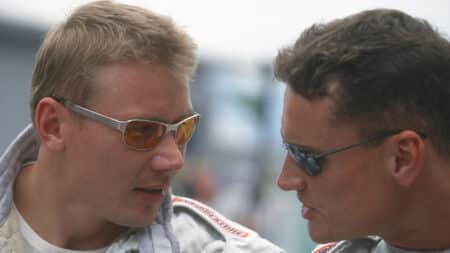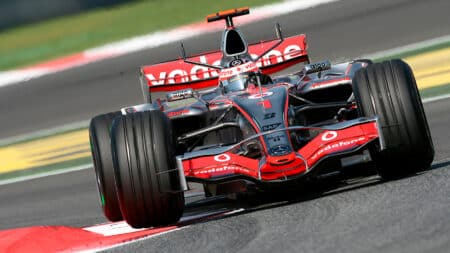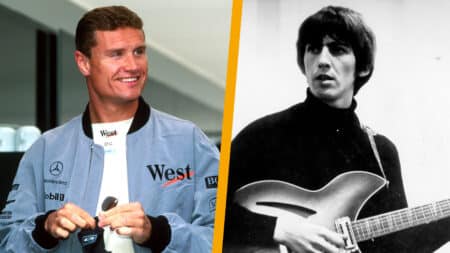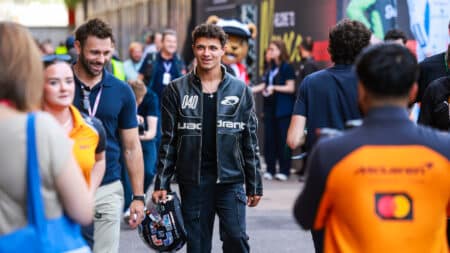
'It got frosty!' Häkkinen and Coulthard to take F1 rivalry on tour
Former McLaren F1 team-mates Mika Häkkinen and David Coulthard are set to renew old rivalries in a new Evening with... tour – they told James Elson all about it
It’s said that he didn’t much like the circuit; too many slow corners apparently. But, being an efficient sort, he dealt with it: again and again and again, then again and again and again.
Michael Schumacher had already won Montreal’s Canadian Grand Prix on six occasions by the time he dead-batted questions about his struggles in qualifying there in 2004. Michelin’s softer covers had given its runners an edge in single-lap qualifying and relegated the runaway championship leader’s Bridgestone-shod Ferrari to sixth.
Word was that the Scuderia was in good shape for the race, however, and, somewhat ominously for those ahead of him, Schumacher shrugged: “We will deal with it.”

He had already won six of the first seven GPs that season. But five of those victories had been from pole. At least we knew that Canada – as it tends to be, being unusually light on downforce while heavy on brakes – would be different.
Ferrari team-mate Rubens Barrichello certainly sensed an opportunity. On softer Bridgestones and a lighter fuel load, he planned an attack – having qualified seventh after a small mistake in qualifying.
The latter error was compounded when Schumacher muscularly rebuffed the fast-starting Kimi Räikkönen.
Already Michael was dealing with it.
It took Barrichello six laps to pass the Finn’s McLaren. Although he then closed the gap, a cagey stalemate ensued until the first round of stops.

There was reckoned to be not much difference between two- and three-stopping, and a flurry of activity enlivened laps 13 to 17 as the front-runners – Jenson Button’s BAR-Honda and the walrus-nosed Williams-BMW of Juan Pablo Montoya, the pole-sitting Williams of early leader Ralf Schumacher and Renault’s Fernando Alonso – dived in for fuel and rubber.
Barrichello pitted on lap 18, Schumacher on lap 19. Hmm. Ralf still led, from Button, but just before mid-distance it became apparent that they were three-stopping – and that the Ferraris weren’t.
It was now that Barrichello turned the wick up – and Michael dealt with it, just as he had with the monstering Montoya earlier. Rubens made a couple of feints and jinks, had a couple of looks, but his brakes were overheating in the slipstream and his pedal had gone disconcertingly long.
Schumacher was never going to fall for a dummy or bluff. It had to be all or nothing, aka second. Nobody knew that better than Barrichello.

Ralf regained the lead for a lap, but his brother’s pace towards the end of his second stint – he stayed out three laps longer than Barrichello, and held a sideways moment entering the pitlane – was decisive. Michael resumed the lead when Ralf pitted and was able to control the gap thereafter.
Seven wins
Five second places
Six pole positions
Four fastest laps
Largest pole position margin:
0.515sec over Ralf Schumacher (2001)
Largest margin of victory:
39.66sec over Jean Alesi (1994)
Barrichello, in contrast, had made another small but significant error when those brakes caught him out and a grassy moment at Turn 8 cost him five seconds and – or so it appeared – second place.
Both Williams – Montoya had finished fifth – were later disqualified because of incorrectly shaped, as opposed to sized, brake ducts that likely cost rather than gained it performance.
Failing to deal with it.
Schumacher’s 77th victory of his career – the seventh of a record-breaking campaign – made him the first driver to win the same country’s GP on seven occasions. All those sevens – there had to be a bit of luck involved somewhere. And perhaps there was. A bit.

Alonso was also two-stopping, the theory being that the extra kg of fuel put less stress on brakes than would the extra g created by fresher rubber. A sticking fuel hose, plus some unanticipated graining early in his second stint, cost him time, but his race was just “coming alive” when a driveshaft broke. He was a closing third and on the verge of his second stop at the time.
His team-mate Jarno Trulli, who still appeared to hold an edge in terms of single-lap speed, and who had halted Schumacher’s run with victory from pole at Monaco, also retired because of a broken driveshaft, albeit seconds after the start. Any chance of two Renaults being able to control the race – i.e. Schumacher – had been squandered.
There appeared no likely end to it: the dominance of the Scuderia Ferrari of Schumacher, Brawn, Bridgestone, Bryne and Todt. It just dealt with it. All of it. Pretty much all of the time.
Yet nothing lasts forever.

A change of tyre regulation. A hungry young Spaniard in a team dealing with it. The ego of a sidelined boss. A rock in the snow.
Michael seems so sensationally fresh in the contemporary footage from Canada 2004: fit, strong, confident, verging on superhuman. Those same assets are now carrying him through his greatest challenge.
Let’s hope they ultimately allow him to deal with it.
Never mind 10 years, I can’t believe it’s already been five months.

Former McLaren F1 team-mates Mika Häkkinen and David Coulthard are set to renew old rivalries in a new Evening with... tour – they told James Elson all about it

In Formula 1, driver contracts may look iron-clad on paper, but history shows that some of its biggest stars have made dramatic early exits

Former McLaren F1 ace told James Elson about his private audience with The Beatles' George Harrison, who played an unreleased grand prix-themed song

As he fights for the F1 title, Lando Norris cements his influence off track with the sale of Quadrant to esports powerhouse Veloce